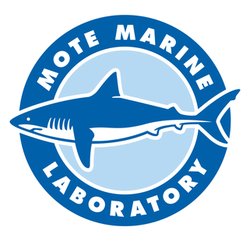Mote Marine Laboratory

Official logo
|
|
| Date opened | 1955 |
|---|---|
| Location | Sarasota, Florida |
| Coordinates | 27°19′58.5″N 82°34′37.7″W / 27.332917°N 82.577139°WCoordinates: 27°19′58.5″N 82°34′37.7″W / 27.332917°N 82.577139°W |
| Land area | 10.5 acres (4.2 ha) |
| Number of species | 100+ |
| Memberships | AZA |
| Website | www |
Mote Marine Laboratory is an independent, not-for-profit marine research organization based on City Island in Sarasota, Florida. Founded in 1955 by Eugenie Clark in Placida, Florida, it was known as the Cape Haze Marine Laboratory until 1967. The laboratory aims to advance the science of the sea, both through its marine and estuarine research labs and through the public Mote Aquarium and its affiliated educational programs.
Founded by Dr. Eugenie Clark in 1955 in Placida, Florida, it was known as Cape Haze Marine Laboratory until its 1967 renaming in honor of major benefactors of the laboratory William R. Mote, his wife Lenore, and his sister, Betty Mote Rose. Mote's early research was focused on sharks. Since 1960, Mote has been based in Sarasota, Florida, and has been located on City Island since 1978.
Mote Marine Laboratory celebrated its 55th Anniversary during 2010. The Lab was recognized for its 55 years of marine science with a resolution in the Florida House and Senate in March 2010. Founder Clark was also recognized in March 2010 with an induction to the Florida Women's Hall of Fame.
The laboratory celebrated its 60th anniversary in 2015 and unveiled its first multi-year, comprehensive fundraising effort, Oceans of Opportunity: the Campaign for Mote Marine Laboratory. Clark was still working as Senior Scientist, Director Emerita, and Trustee at the laboratory when she died in February 2015.
As of 2015, Mote employs over 200 staff members conducting research on 25 different programs (Coral Reef Ecology & Microbiology; Chemical and Physical Ecology; Phytoplankton Ecology; Ocean Acidification; Marine & Fresh Water Aquaculture; Fisheries Habitat Ecology; Stranding Investigations; Ecotoxicology; Shark Biology & Conservation; Fisheries Ecology & Enhancement; Coral Reef Monitoring & Assessment; Coral Reef Restoration; Dolphin, Whale & Sea Turtle Hospitals; Environmental Health; Ocean Technology; Behavioral Ecology & Physiology; Marine Immunology; Benthic Ecology; Marine Biomedical Research; Environmental Laboratory for Forensics; Sea Turtle Conservation & Research; Spotted Eagle Ray Conservation; Manatee Research; Coral Health & Disease; and the Sarasota Dolphin Research Program). The Sarasota Dolphin Research Program, a partnership of Mote Marine Laboratory and the Chicago Zoological Society, conducts the world's longest-running study of a dolphin population.
...
Wikipedia
